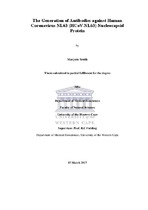| dc.description.abstract | Coronaviruses (CoVs) are enveloped viruses composed of single-stranded, positive sense
RNA viruses with the largest viral genomes among RNA viruses (27-33 kb). In 2004,
human coronavirus NL63 (HCoV-NL63) was discovered by researchers from The
Netherlands. Since its discovery, it has been found in countries all over the world and affects mainly
young children between ages 0-5 years old, immunocompromised and elderly people.
HCoV-NL63 has been indicated to cause both mild upper and more serious, but less
common, lower respiratory tract infections and are commonly associated with other
respiratory viruses in co-infections that can increase the severity of HCoV-NL63
infection. The nucleocapsid (N) protein of HCoV-NL63 is a multifunctional
phosphoprotein that modulates the assembly of the ribonucleocapsid core of mature
virions. During infection, the N protein is expressed at high levels within an infected cell
and elicits a strong immune response in infected patients. For this reason, N protein was
used to generate antibodies against an immune response to the presence of HCoV-NL63
N protein in mouse blood serum. | |

